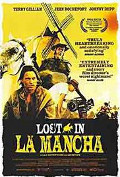
Directed by
Louis Pepe & Keith Fulton
93 minutes
Rated M
Reviewed by
Bernard Hemingway

Lost In La Mancha
Synopsis: Director Terry Gilliam has long nursed the idea of bringing Don Qixote, Cervantes’ classic novel of romantic idealism to the screen. This attempt, to be shot on location in Spain turns out to be an unmitigated disaster.
An early death helps greatly if you’re seeking legendary status. Compare James Dean to Marlon Brando. One can’t help but feel that Gilliam’s small death on this project was a blessing in disguise. Although the overly-circumspect makers of this documentary Louis Pepe and Keith Fulton acknowledge one of Gilliam’s lead balloons, The Adventures of Baron Munchausen (1988) largely it seems because the director does himself, they might have included virtually every film the former Python animator has made since his brilliant 1985 black comedy, Brazil. From that lofty prominence, Gilliam’s career has been a slow and bumpy tumble to the depths of Fear and Loathing in Las Vegas (1998). Although one of the factors blamed for bringing this production undone is its relatively small (US$32 million) budget, Gilliam undoubtedly was mighty glad to find anyone to back him (and they, all 60 of them, actually turn up on the set to watch their money going down the toilet).
They needn't have bothered. Imagine this as a concept – a film of Cervantes’s novel but ditch the portly squire Sancho Panchez and substitute Johnny Depp in the guise of an advertising executive transported through time and, wait for it, get Vanessa Paradis (at that time Mrs Depp) to play the love object. And last, but not least, roll-in some old French guy (Jean Rochefort) who speaks halting English to play the Don. (Did anyone think of giving Peter O’Toole a tingle?). If just that précis is not enough to spell fiscal Armageddon, then meet the director, who in manner and looks resembles Robert Crumb’s self-immolated brother Charles, and who appears to be suffering from, if you’ll excuse the pun, the cinematic equivalent to Munchausen’s disease-by-proxy. One can only assume that Gilliam is a charismatic personality. Nothing else would explain why otherwise experienced film professionals would be involved with him, or why, given the number of films that he has made, he himself would head into this project with such a cavalier approach to its nuts-and-bolts (even his psychologically-antithetical first Assistant Director cannot cope and eventually walks).
Unfortunately the makers of this documentary (who had made a 1996 making-of documentary on 12 Monkeys,1995) have missed the potentially most entertaining subject here, which would have been Gilliam himself and the responses to him of the people involved in the project. Had they pursued this they may have come up with a fascinating piece of "reality" cinema. Of course they were not to know this at the outset. The intention appears to have been a dutiful making-of documentary. It only is by happenstance that it turned out to be a dutiful not-making-of documentary. As such, over 93 minutes we track the miserable decline from high-five ebullience to ennervated staring-into-space. Whilst this is nicely put together it will appeal to those interested in the back-end of film production rather than the general viewer.

Want more about this film?


Want something different?




